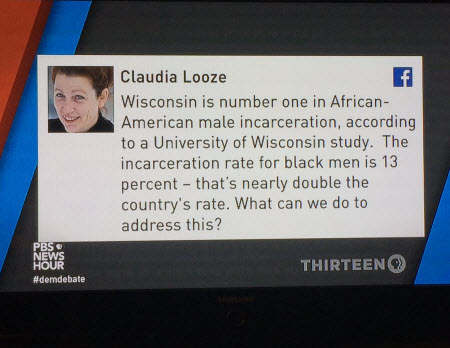A Political Junkie Joins the National Debate
The smarter way to stay on top of the multichannel video marketplace. Sign up below.
You are now subscribed
Your newsletter sign-up was successful

Claudia Looze, program director at statewide public-affairs channel WisconsinEye, has her share of friends in the state’s press corps — none of whom expected to hear her question, via Facebook, asked during the PBS NewsHour Democratic presidential candidates’ debate in Milwaukee between Hillary Clinton and Bernie Sanders last Thursday night (Feb. 11).
Looze didn’t even know it was coming, but it was the first Facebook-submitted question of the night. “That was shocking,” she told The Wire on Friday.
It was a good sign, though, that PBS had recommended she change her Facebook profile picture — to one of herself smiling from a found photo of a girl holding a chicken.
Her question, about the high rate of African-American male incarceration in Wisconsin, prompted thoughtful answers from the Democratic presidential contenders.
She said she was pleased that they spoke at length about incarceration and then about race relations, “which I think needs to be addressed.”
Afterward, she received many messages of congratulations, including from former co-workers at Milwaukee Public Television, which produced the telecast.
A longtime documentary filmmaker, Looze joined WisconsinEye before it launched in 2007. “I got bit by the political junkie bug and really love covering it. It’s really an interesting time to be covering state politics, especially, because so much happens in the state legislature that affects a citizen’s life, much more than at the federal level.” The channel's greatest hits include the documentary "Milwaukee: A City Built on Water" and it's currently doing a series of interviews with candidates for election in the state.
The smarter way to stay on top of the multichannel video marketplace. Sign up below.
WisconsinEye is about to do a promotional push “to entice people to become informed and come watch their government at work, and the government that affects them the most on a daily basis,” the Wisconsin native said.
The channel — independently funded, with no money from the state (or from cable operators, though they provide carriage) — has for the first time hired an agency to help with promotion, she said.
And, since the first of the year, WisconsinEye programming is available on mobile phones and laptops, not just TV or desktops.
Looze hopes the channel might even host a debate of its own, in the big U.S. Senate race between Democrat Russ Feingold and incumbent Republican Ron Johnson, possibly partnering with the Milwaukee Journal Sentinel’s JSOnline.
“That would be a big leap for us, but I think we are ready,” she said. No question about it.
— Kent Gibbons
Nat Geo’s ‘Gen X’ Series to Mark Overlooked Demo
Squeezed between the baby boomers and millennials is Generation X: People born between 1961 and 1981 who are rarely recognized for their role at the forefront of America’s cultural and technological development.
National Geographic Channel’s three-part series Generation Xseeks to shed light on these 65 million Americans. Nat Geo vice president of production and development Kevin Mohs (himself a Gen X-er) spoke with The Wire about the series, which premieres tonight (Feb. 15).
MCN:Why hasn’t there been a greater focus on Gen-Xers?
Kevin Mohs: This generation has been overlooked or portrayed as slackers who haven’t done much in their lives, and [as] just being disgruntled. But when you really step back and look, you see that seismic shifts have happened because of this generation.
MCN: What are some Gen X-er achievements?
KM: Take a look at Wikileaks. Why would somebody think it’s OK to leak national secrets to the world? But then you step back and say, what were the things that formed that person that did that? Then you look at Watergate and the Pentagon Papers and the culmination of all those things that created that mindset. Same thing with Google and Amazon — how did someone think so out of the box to create those services? But if you step back and look at the bigger picture at what influenced such disruptors — MTV, fast foods, Napster — all things that were breaking the mold, that’s how you come up with these great things. How does Obama become the first African-American president? We look at all the things within that generation that set the tone for what has happened today.
MCN: Will Gen X-ers ever get their due?
KM: This special will hopefully help to get that recognition because now the generation will be put on the map. We’re saying, look what this generation has accomplished, and here’s why. Hopefully people will begin talking about it … then we can be in the discussion with the baby boomers and the millennials.
MCN: So what will viewers discern from the series?
KM: We want to know what were the pivotal moments for the generation. It’s a really fast-paced way to explore the generation through the eyes of celebrities like Kevin Smith, Courtney Love, Sarah Palin and Molly Ringwald, along with a variety of experts and people providing different perspectives on the generation.
— R. Thomas Umstead
